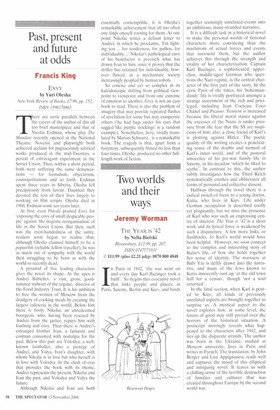Past, present and future at odds
Francis King
ENVY by Yuri Olesha New York Review of Books, £7.99, pp. 152, ISBN 1590170865 There are eerie parallels between the career of the author of this all too brief masterpiece and that of Nicolai Erdman, whose play The Mandate recently opened at the National Theatre. Novelist and playwright both achieved acclaim for pugnaciously satirical works produced in the mid-Twenties, a period of extravagant experiment in the Soviet Union. Then, within a short period, both were suffering the same denunciations — for formalism, objectivism, cosmopolitanism and so forth. Erdman spent three years in Siberia, Olesha fell precipitously from favour. Daunted, they devoted the rest of their lives largely to working on film scripts. Olesha died in 1960, Erdman some ten years later.
At first, even Pravda praised Envy for 'exposing the envy of small despicable people' against 'the majestic reorganisation' of life in the Soviet Union. But then, such was the even-handedness of the satire, readers soon began to realise that, although Olesha claimed himself to be a popuichik (reliable fellow traveller), he was as much out of sympathy with the world then struggling to be born as with the world so recently dead.
A pyramid of five leading characters gives the novel its shape. At the apex is Andrei Babichev, a vast, gross, goodnatured stalwart of the regime, director of the Food Industry Trust. It is his ambition to free the women of Moscow from the drudgery of cooking meals by creating the largest cafeteria in the world. Below him there is firstly Nikolai, an unredeemed bourgeois, who, having been rescued by Andrei from the gutter, repays him with loathing and envy. Then there is Andrei's estranged brother Ivan, a fantasist and conman consumed with nostalgia for the past. Below this pair are Volodya, a wellknown footballer, also a protégé of Andrei, and Valya, Ivan's daughter, with whom Nikolai is in love but who herself is in love with Volodya. In the clash of eras that provides the book with its theme, Andrei represents the present, Nikolai and Ivan the past, and Volodya and Valya the future.
essentially contemptible, it is Olesha's remarkable achievement that all too often one finds oneself rooting for them. At one point Nikolai writes a defiant letter to Andrei, in which he proclaims, Tin fighting you ... for tenderness, for pathos, for individuality...' Nikolai's pathological envy of his benefactor is precisely what has drawn Ivan to him, since it proves that the drifter has retained his individuality, however flawed, in a mechanistic society increasingly peopled by human robots.
So concise and yet so complex in its kaleidoscopic shifting from political viewpoint to viewpoint and from one extreme of emotion to another, Envy is not an easy book to read. There is also the problem of imagery that may provide repeated flashes of revelation for some but may exasperate others ('he had bags under his eyes that sagged like purple stockings' is a random example). Nonetheless, here, vividly translated by Marian Schwartz, is a remarkable book. The tragedy is that, apart from a fairystory, subsequently filmed no less than four times, Olesha produced no other fulllength work of fiction.


























































































 Previous page
Previous page